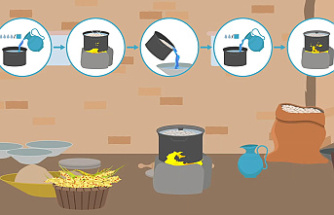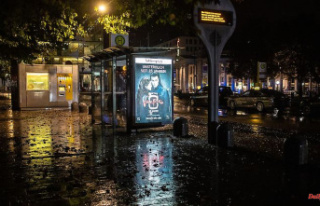Even before the current energy price crisis, times were not easy for ski resorts. Warmer winters and an aging population are not good for the industry. A very difficult season is ahead.
Munich (dpa/lby) - Skiing will be around ten percent more expensive on average in many ski areas on both sides of the Bavarian-Austrian border next winter. Apart from that, the operators are preparing cost-cutting measures intended to mitigate the increase in energy costs. This ranges from shorter snow-making times and reduced seat heating to no night skiing with floodlights, as six ski areas reported on request.
In Garmisch-Partenkirchen, for example, the price of a day ski pass for adults will rise from 50 to 55 euros compared to last season, and there will be an additional 2 euros each at Christmas and during the carnival holidays. The situation is very similar in the Christlum am Achensee ski area in Tyrol, which is popular with Upper Bavarian skiers: an adult ticket should cost 55 instead of 50 euros, according to managing director Nina Kofler.
At the Bergbahnen Oberstdorf Kleinwalsertal - the German-Austrian merger of six areas in the Allgäu and Vorarlberg - the day ski pass is also 5 euros or almost ten percent more expensive, the new price is 57.50 euros. "That's the industry average," says Marketing Manager Jörn Homburg.
In fact: This also applies to Kitzbühel and its neighboring ski areas in Kirchberg and Mittersill: "The ticket prices have been adjusted between nine and ten percent compared to the previous year, due to the high energy costs," says a spokeswoman for the "KitzSki" association.
In some places, the percentage price increases are even higher, especially in the areas that traditionally have slightly lower prices: At Brauneck in Lenggries and at Sudelfeld, the day ski pass for adults will cost 48 euros this winter, 6 euros more than in the past season. At Spitzingsee there is also a price increase of 6 to 45 euros, according to the local Alpen Plus ski area association.
In most ski resorts, the prices for seasonal and other special tickets will rise less sharply. In general, the winter holiday regions have to prepare for a difficult to weak season. Skiing is not cheap anyway, and according to the Nuremberg market research institute GfK, consumer sentiment in Germany is in the basement.
A YouGov survey commissioned by the clothing manufacturer Schöffel recently revealed that a quarter of potential winter holidaymakers are considering forgoing a holiday in the snow. Not only the ski passes are becoming more expensive, but also the accommodation. According to the State Statistical Office, overnight stays in Bavaria were on average almost 14 percent more expensive in October than a year earlier.
Many of the comparatively small Bavarian ski areas live predominantly from day visitors, so that the hotel costs are virtually irrelevant for their visitors. However, the situation is different in larger winter holiday regions with many holidaymakers, such as in Kitzbühel or in the Allgäu.
All ski areas want to save costs: "Of course we plan to save energy, since the increase in energy costs cannot be passed on to guests and ticket prices," says a spokeswoman in Kitzbühel. In the world-famous Tyrolean ski area, there should be no night skiing, the seat heating in the lifts is only switched on when the temperature is below zero.
The electricity costs are caused on the one hand by the operation of the lifts, the second factor is the snow cannons. In Oberstdorf and in the Kleinwalsertal, the mountain railways no longer want to make snow in the mornings and evenings at the previous peak consumption times, as Marketing Manager Homburg says. The "frequency-dependent use of transport" is also planned - with less operation, the trains run less frequently or more slowly.
The artificial snow is already a thorn in the side of environmental organizations because of the associated electricity and water consumption. For this reason, many ski areas were trying to reduce electricity consumption even before the current energy price crisis. In the Christlum ski area, for example, the snow groomers are equipped with sensors to measure the snow depth, says Managing Director Nina Kofler. "We only produce as much snow as we need." According to Marketing Manager Homburg, Oberstdorf and Kleinwalsertal only use green electricity.
The Berchtesgadener Bergbahn refers to figures from the VDS cable car association, according to which the energy consumption per person and day of skiing amounts to 16 kilowatt hours, roughly as much as a middle-class car needs for 22 kilometers. Reducing the driving speed is one possibility. "When heating rooms, we are guided by the specifications for public buildings or authorities," says a spokeswoman.












